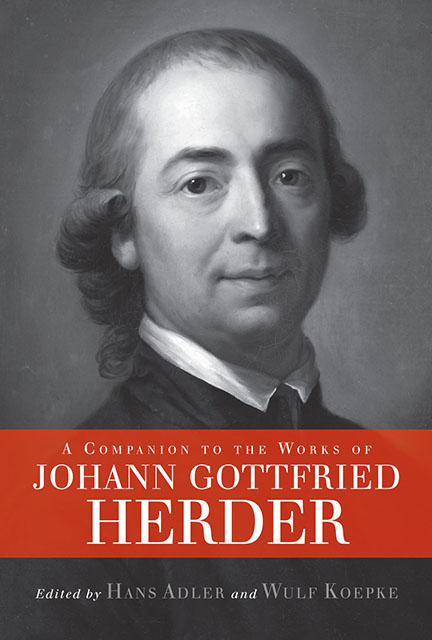Book contents
- Frontmatter
- Contents
- Acknowledgments
- List of Abbreviations
- Introduction
- 1 Herder's Life and Works
- 2 Herder's Epistemology
- 3 Herder and Historical Metanarrative: What's Philosophical about History?
- 4 Herder's Concept of Humanität
- 5 Herder and Language
- 6 Herder's Aesthetics and Poetics
- 7 Myth, Mythology, New Mythology
- 8 Particular Universals: Herder on National Literature, Popular Literature, and World Literature
- 9 Herder's Views on the Germans and Their Future Literature
- 10 Herder's Biblical Studies
- 11 Herder's Theology
- 12 Herder and Politics
- 13 Herder's Poetic Works, His Translations, and His Views on Poetry
- 14 Herder's Style
- 15 Herder as Critical Contemporary
- 16 Herder in Office: His Duties as Superintendent of Schools
- 17 Herder's Reception and Influence
- Bibliography
- Notes on the Contributors
- Index
3 - Herder and Historical Metanarrative: What's Philosophical about History?
Published online by Cambridge University Press: 28 February 2023
- Frontmatter
- Contents
- Acknowledgments
- List of Abbreviations
- Introduction
- 1 Herder's Life and Works
- 2 Herder's Epistemology
- 3 Herder and Historical Metanarrative: What's Philosophical about History?
- 4 Herder's Concept of Humanität
- 5 Herder and Language
- 6 Herder's Aesthetics and Poetics
- 7 Myth, Mythology, New Mythology
- 8 Particular Universals: Herder on National Literature, Popular Literature, and World Literature
- 9 Herder's Views on the Germans and Their Future Literature
- 10 Herder's Biblical Studies
- 11 Herder's Theology
- 12 Herder and Politics
- 13 Herder's Poetic Works, His Translations, and His Views on Poetry
- 14 Herder's Style
- 15 Herder as Critical Contemporary
- 16 Herder in Office: His Duties as Superintendent of Schools
- 17 Herder's Reception and Influence
- Bibliography
- Notes on the Contributors
- Index
Summary
THERE IS SOME TRUTH in Goethe's pronouncement that Johann Gottfried Herder's ideas had been both absorbed and forgotten by the conventional wisdom of German culture after 1800. He was absorbed either into the project of the Jena Romantiker and their literary hermeneutics or into the project of Hegel and his philosophy of history. But after the rise of historicism in the school of Ranke and Droysen, a retrospective redemption seemed possible. Thus, in the classic formulations of Meinecke and Stadelmann, Herder was resurrected as the “father of historicism.” He was credited with pioneering the stress on individuality, development, and the “historical sense” of Einfühlung (or Verstehen [empathy]) that became the core of the disciplinary matrix of history in the nineteenth century.
What are we to make of this claim? I propose to affirm and to reject it in equal measures. On the one hand, a case can be made that Herder was a pioneer of hermeneutic historicism, though he was a philologist and a philosopher of history more than he was a historian. There is a case to be made that everything Herder wrote expressed a historical point of view, whether he discussed philosophy, literature, or language. From a methodological vantage point, then, Herder was “historicist” in everything he did. On the other hand, he was not a member of the academic guild of historians; indeed, in his famous controversy with the eminent Göttingen professor of history August von Schlözer, he antagonized them irretrievably. Current historians of the rise of the discipline in the eighteenth century, accordingly, minimize his role. Yet there is merit to the retrospective acknowledgment by historical theorists, starting with Wilhelm Dilthey, that Herder was a progenitor of their practice. But, finally, the notion of “historicism” developed by Stadelmann and Meinecke is deeply flawed by a German nationalism, an “irrationalism,” and a radical relativism that must not be projected uncritically back onto Herder.
In this essay I wish to explore what it means to call Herder a philosopher of history, and I shall accordingly focus on his two great works in that genre: Auch eine Philosophie der Geschichte zur Bildung der Menschheit (Another Philosophy of History for the Education of Humankind, 1774), and Ideen zur Philosophie der Geschichte der Menschheit (Ideas on the Philosophy of the History of Humankind, 1784ff.). To begin with, we can invoke the widely used distinction between “critical” and “speculative” philosophy of history.
- Type
- Chapter
- Information
- A Companion to the Works of Johann Gottfried Herder , pp. 65 - 92Publisher: Boydell & BrewerPrint publication year: 2009
- 17
- Cited by



